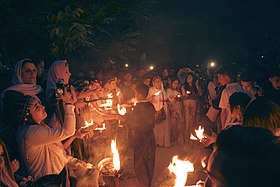
Back Jesiede Afrikaans Jesiden ALS اليزيدية Arabic ܐܝܙܝܕܝܐ ARC يزيديين ARZ য়াজিদি Assamese Yezidilər Azerbaijani یزیدلیلر AZB Езіды Byelorussian Езиди Bulgarian
 | |
| Total population | |
|---|---|
| est. 700,000–1,500,000[1][2][3] | |
| Regions with significant populations | |
| See list of Yazidi settlements | |
| Listed by countries | |
| 500,000–700,000[4][5] | |
| 200,000 (2019 estimate)[6][7] | |
| 40,586 (2010 census)[8] | |
| 35,272 (2011 census)[9] | |
| 35,000 (2018 estimate)[10] | |
| 12,174 (2014 census)[11] | |
| 10,000 (2017 estimate)[12] | |
| 10,000 (2018 estimate)[13][14] | |
| 10,000 (2017 estimate)[15][16] | |
| 6,000 (2018 estimate)[17] | |
| 5,000 (2010 estimate)[18][19] | |
| 2,738 (2019 estimate)[20] | |
| 1,200 (2018 estimate)[21] | |
| Languages | |
| Northern Kurdish,[22] North Mesopotamian Arabic (in Bashiqa and Bahzani)[23] | |
| Part of a series on the Yazidi religion Yazidism |
|---|
 |
Yazidis, also spelled Yezidis (/jəˈziːdiz/ ⓘ;[24] Kurdish: ئێزیدی, romanized: Êzidî),[25][26] are a Kurdish-speaking[23] endogamous[27][28] religious group who are indigenous to Kurdistan, a geographical region in Western Asia that includes parts of Iraq, Syria, Turkey and Iran.[29][30][31] The majority of Yazidis remaining in the Middle East today live in Iraq, primarily in the governorates of Nineveh and Duhok.[32][33]
There is a disagreement among scholars and in Yazidi circles on whether the Yazidi people are a distinct ethnoreligious group or a religious sub-group of the Kurds, an Iranic ethnic group.[34][35] Yazidism is the ethnic religion of the Yazidi people and is monotheistic in nature, having roots in a pre-Zoroastrian Iranic faith.[36][37][38][39][40]
Since the spread of Islam began with the early Muslim conquests of the 7th–8th centuries, Yazidis have faced persecution by Arabs and later by Turks, as they have commonly been charged with heresy by Muslim clerics for their religious practices.[citation needed] Despite various state-sanctions in the Ottoman Empire, Yazidis historically have lived peacefully in proximity with their Sunni neighbours.[41] In modern times, Yazidis face persecution by the PKK and ISIS.[42][43] Due to ongoing terrorist attacks in Kurdish regions, many Yazidis sought refuge in Western countries.[44] Recently, some Yazidis have returned to their home villages in Turkey.[45]
The 2014 Yazidi genocide that was carried out by the Islamic State saw over 5,000 Yazidis killed and thousands of Yazidi women and girls forced into sexual slavery,[46] as well as the flight of more than 500,000 Yazidi refugees.[47][48][49]
- ^ Lamb, Christina (22 September 2020). Our Bodies, Their Battlefields: War Through the Lives of Women. Simon and Schuster. p. 24. ISBN 978-1-5011-9917-2.
- ^ "Aziz Tamoyan blames unknown forces for crippling history and culture of Yazidis". armenpress.am. Retrieved 10 January 2021.
- ^ https://www.washingtonpost.com/world/2022/02/04/yazidi-religion-isis-genocide-syria/
- ^ "Surviving Islamic State: The Plight Of The Yazidi Community". Nikita Malik. Forbes. Retrieved 13 January 2019.
- ^ Henne, Peter; Hackett, Conrad (12 August 2014). "Iraqi Yazidis: Hazy population numbers and a history of persecution". Pew Research Center. Retrieved 30 August 2021.
- ^ Alkaidy, Gohdar (28 January 2019). "Mir Tahsin Said Beg: Oberhaupt der Jesiden stirbt im deutschen Exil". Retrieved 19 May 2019.
- ^ Meyer, Natalie Lydia. "Geschichten vom Leid der Verfolgung". Westfalen-Blatt (in German). Retrieved 19 May 2019.
- ^ Приложение 2. Национальный состав населения по субъектам Российской Федерации. Statistics of Russia (in Russian). Retrieved 22 August 2018.
- ^ "2011 Armenian census" (PDF). Retrieved 18 August 2014.
- ^ "Exhibition in Brussels on the Yazidi community in Iraq". 10 January 2018. Retrieved 13 January 2019.
- ^ "Ethnic Composition of Georgia" (PDF). CSEM. Retrieved 18 May 2019.
- ^ Knapp, Fred. "Iraqis a fast-growing group in Nebraska". netnebraska.org. Archived from the original on 13 May 2018. Retrieved 20 September 2019.
- ^ "La communauté Yézidie en France". Retrieved 13 January 2019.
- ^ "Non, les Yézidis ne sont pas voués à disparaître". 1 August 2018. Retrieved 13 January 2019.
- ^ Armstrong, Kerrie (22 August 2017). "The Yazidi people: who are they and why are they on the run?". Explainer. SBS. Retrieved 25 February 2019.
- ^ Andrea Glioti (18 October 2013). "Yazidis Benefit From Kurdish Gains in Northeast Syria". al-monitor. Archived from the original on 19 February 2014. Retrieved 1 April 2014.
- ^ "Många yazidier fortfarande försvunna" (in Swedish). SVT. 9 January 2018. Retrieved 13 January 2019.
- ^ "Turkey". U.S. Department of State. Retrieved 22 January 2019.
- ^ International Religious Freedom (2010): Annual Report to Congress. DIANE Publishing. ISBN 9781437944396.
- ^ "Statement on ABC Four Corners reporting". homeaffairs.gov.au. Retrieved 21 August 2019.
- ^ "For a Yazidi refugee in Canada, the trauma of ISIS triggers rare, terrifying seizures". 1 December 2018. Retrieved 13 January 2019.
- ^ Dalalyan, Tork (January 2011). "Construction of Kurdish and Yezidi Identities among the Kurmanji-speaking Population of the Republic of Armenia, in". Changing Identities: Armenia, Azerbaijan, Georgia (Collection of Selected Works, Edited by V. Voronkov, S. Khutsishvili, J. Horan), Heinrich Böll Stiftung South Caucasus: 189.
- ^ a b Cite error: The named reference
iranicawas invoked but never defined (see the help page). - ^ "Yazidi". Oxford Dictionaries | English. Archived from the original on 3 August 2017. Retrieved 13 March 2019.
- ^ Kreyenbroek, Philip G.; Rashow, Khalīl Jindī (2005). God and Sheikh Adi are Perfect: Sacred Poems and Religious Narratives from the Yezidi Tradition. Otto Harrassowitz Verlag. p. 118. ISBN 3-447-05300-3.
- ^ خانمانی ئێزیدی جــلـی رهش فڕێدهدهن (in Kurdish). Retrieved 13 February 2020.
- ^ Açikyildiz, Birgül (23 December 2014). The Yezidis: The History of a Community, Culture and Religion. I.B.Tauris. ISBN 9780857720610.
- ^ Gidda, Mirren (8 August 2014). "Everything You Need to Know About the Yazidis". TIME.com. Retrieved 7 February 2016.
- ^ Nelida Fuccaro (1999). The Other Kurds: Yazidis in Colonial Iraq. London & New York: I. B. Tauris. p. 9. ISBN 1860641709.
- ^ Pirbari, Dimitri; Grigoriev, Stanislav. Holy Lalish, 2008 (Ezidian temple Lalish in Iraqi Kurdistan).
- ^ Omarkhali, Khanna (2017). The Yezidi religious textual tradition, from oral to written : categories, transmission, scripturalisation, and canonisation of the Yezidi oral religious texts: with samples of oral and written religious texts and with audio and video samples on CD-ROM. Harrassowitz Verlag. ISBN 978-3-447-10856-0. OCLC 994778968.
- ^ Kane, Sean (2011). "Iraq's disputed territories" (PDF). PeaceWorks. United States Institute of Peace. Retrieved 15 October 2018.
- ^ "On Vulnerable Ground – Violence against Minority Communities in Nineveh Province's Disputed Territories" (PDF). Human Rights Watch. November 2009. Retrieved 15 October 2018.
- ^ Ali, Majid Hassan (15 February 2019). "The identity controversy of religious minorities in Iraq: the crystallization of the Yazidi identity after 2003". British Journal of Middle Eastern Studies. 47 (5): 15. doi:10.1080/13530194.2019.1577129. S2CID 150358224.
- ^ "UNHCR's Eligibility Guidelines for Assessing the International Protection Needs of Iraqi Asylum-Seekers" (PDF). pp. 11, 76.
- ^ Turgut, Lokman. Ancient rites and old religions in Kurdistan. OCLC 879288867.
- ^ Kaczorowski, Karol (2014). "Yezidism and Proto-Indo-Iranian Religion". Fritillaria Kurdica. Bulletin of Kurdish Studies.
- ^ Omarkhali, Khanna (2011). The status and role of the Yezidi legends and myths: to the question of comparative analysis of Yezidism, Yārisān (Ahl-e Haqq) and Zoroastrianism: a common substratum?. OCLC 999248462.
- ^ Kreyenbroek 1995.
- ^ Bozarslan, Hamit; Gunes, Cengiz; Yadirgi, Veli, eds. (22 April 2021). The Cambridge History of the Kurds (1 ed.). Cambridge University Press. doi:10.1017/9781108623711. ISBN 978-1-108-62371-1. S2CID 243594800.
- ^ "The Yazidi Genocide: An Introduction". Post Conflict Research Center. 8 September 2017. Retrieved 1 February 2024.
- ^ "Iraqi Yazidis: Trapped Between the KDP and the PKK | The Washington Institute". www.washingtoninstitute.org. Retrieved 1 February 2024.
- ^ "Yezidiler ve PKK gerçeği". Milliyet (in Turkish). 6 July 2022. Retrieved 1 February 2024.
- ^ Taşğin, Ahmet. "Yezîdiyye". TDV İslâm Ansiklopedisi (in Turkish). Retrieved 31 January 2024.
- ^ "Jesiden in der Türkei: Alte Heimat, neue Heimat - Qantara.de". Qantara.de - Dialog mit der islamischen Welt (in German). 7 May 2015. Retrieved 4 February 2022.
- ^ Callimachi, Rukmini (12 March 2016). "To Maintain Supply of Sex Slaves, ISIS Pushes Birth Control". The New York Times. ISSN 0362-4331. Retrieved 23 January 2022.
- ^ Allison, Christine (25 January 2017). "The Yazidis". Oxford Research Encyclopedia of Religion. Oxford: Oxford University Press. doi:10.1093/acrefore/9780199340378.013.254. ISBN 9780199340378. Archived from the original on 11 March 2019. Retrieved 15 May 2021.
- ^ "Statement by the Commission of Inquiry on Syria on the second anniversary of 3 August 2014 attack by ISIS of the Yazidis". ohchr.org. OHCHR. Retrieved 17 May 2019.
- ^ Suvari, Çakır Ceyhan (2018). "Being Ezidi in the Middle East". Understanding Religious Violence. Springer International Publishing. pp. 195–212. doi:10.1007/978-3-030-00284-8_8. ISBN 978-3-030-00284-8.
© MMXXIII Rich X Search. We shall prevail. All rights reserved. Rich X Search